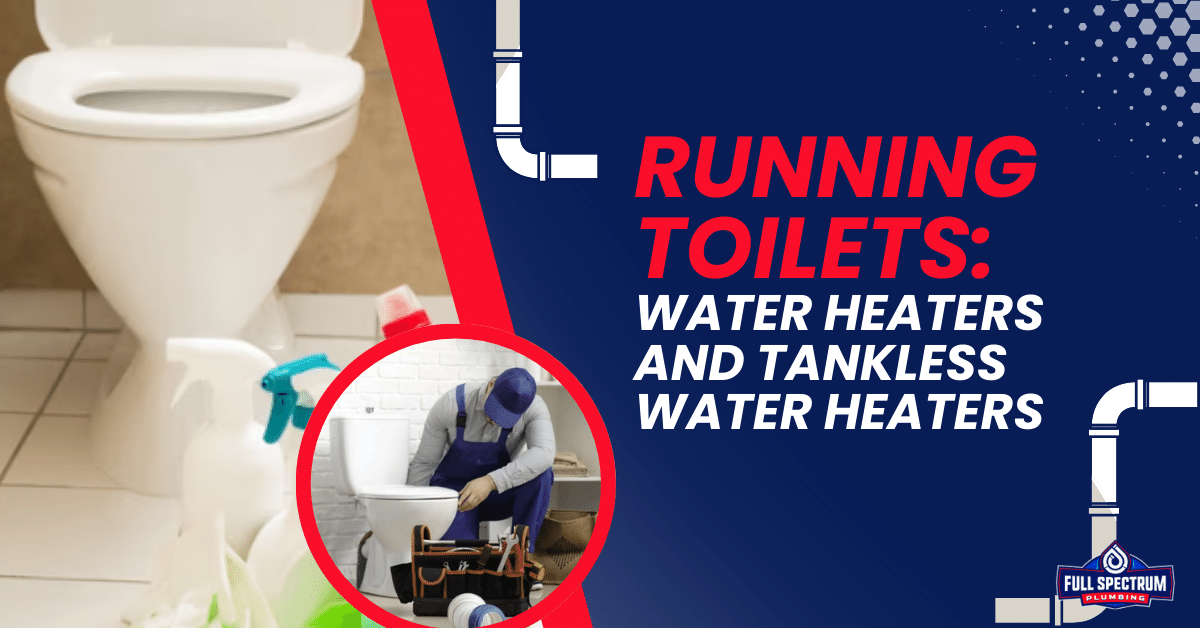Running Toilets: Water Heaters and Tankless Water Heaters
Running Toilets: Water Heaters and Tankless Water Heaters

When it comes to the inner workings of our homes, the relationship between water heaters and toilets might take time to become apparent. However, running toilets can often be linked to issues with your water heater, and understanding this connection can help you maintain a more efficient and trouble-free plumbing system.
What Are The Common Reasons For Running Toilets In Homes With Water Heaters?
Several common reasons can contribute to this problem, and understanding them is crucial for effective troubleshooting and repair. Here are some common causes for running toilets in homes with water heaters:
Faulty Flapper Valve
The flapper valve is a crucial component in the toilet tank. It seals the flush valve and prevents water from continuously flowing into the bowl. If the flapper is worn out or damaged, it may not create a proper seal, leading to a constant flow of water. Inspecting and replacing the flapper can often resolve this issue.
Flapper Chain Issues
The chain connecting the flush handle to the flapper may be too long or too short. If it’s too long, it can get caught under the flapper, preventing it from closing properly. If it’s too short, it may not allow the flapper to open fully during flushing. Adjusting the chain length to ensure smooth movement can help solve this problem.
Water Level Adjustment
An imbalanced water level in the toilet tank can also lead to constant running. If the water level is too high, water may spill into the overflow tube, causing the fill valve to continuously release water. Adjusting the water level to the recommended height can often rectify this issue.
Worn-out Fill Valve
The fill valve is responsible for refilling the tank after flushing. If it becomes worn or damaged, it may not shut off properly, resulting in a continuous flow of water. Replacing the fill valve is a common solution to this problem.
Issues with the Float
The float is a buoyant device that regulates the water level in the tank. If it’s damaged or misaligned, it may not effectively control the water level, leading to a running toilet. Ensuring that the float is functioning correctly and adjusting its position if necessary can help resolve this issue.
Leaking Flush Valve
A leaking flush valve can allow water to escape into the bowl, causing the fill valve to constantly replenish the water. Inspecting the flush valve for leaks and replacing it if necessary can stop the continuous flow.
Sediment Buildup
In areas with hard water, sediment buildup in the toilet tank or on the components can affect their proper functioning. Regular maintenance, including cleaning the tank and components, can help prevent sediment-related issues.
A running toilet in a home with a water heater can result from various issues related to the toilet’s internal components. Identifying the specific cause and addressing it promptly can help conserve water, prevent water waste, and avoid potential damage to the plumbing system.
How Can A Malfunctioning Water Heater Affect The Operation Of A Toilet?
Now, let’s explore how a malfunctioning water heater can disrupt your toilet’s operation. While the water heater doesn’t directly control your toilet’s functions, it plays a crucial role in the overall plumbing system.
If the water heater isn’t functioning correctly, it can lead to variations in water temperature and pressure throughout your home. This inconsistency can impact your toilet’s performance, causing it to run excessively.
For instance, if the water heater fails to maintain the desired water temperature, the toilet’s fill valve may struggle to regulate the incoming water, leading to continuous flushing attempts to keep the tank’s water level.
Similarly, fluctuating water pressure can disrupt the proper functioning of your toilet’s flushing mechanism, potentially causing it to run intermittently.
What Role Does The Water Heater Play In The Water Supply To Tankless Toilets?
The water heater’s role in the water supply becomes even more critical regarding tankless toilets. As the name suggests, tankless toilets lack a traditional tank for storing water. Instead, they rely on a direct water supply connection. A malfunctioning water heater can have a more immediate and noticeable impact in this setup.
If your water heater cannot deliver a consistent and reliable flow of hot water, your tankless toilet may need to be fixed. Tankless toilets often rely on precise temperature and pressure control to operate effectively.
Any fluctuations in these parameters due to a malfunctioning water heater can lead to issues like incomplete flushes, clogs, or even constant running as the toilet tries to compensate for the inconsistent supply.
Are There Energy-efficient Benefits To Using Tankless Water Heaters In Relation To Running Toilets?
Are you tired of dealing with running toilets and high energy bills due to your traditional water heater? Consider switching to a tankless water heater, which can offer multiple benefits for your plumbing system and your wallet. Here are some key points to keep in mind:
- Tankless water heaters are much more energy efficient than tank-based models, because they only heat water when you need it. This avoids the standby loss of heat that occurs in a storage tank, which can account for up to 30% of your water heating costs. By using less energy, you can reduce your carbon footprint and save money on your utility bills.
- The energy efficiency of tankless water heaters can also improve the performance of your toilet and other fixtures. When your water temperature and pressure are consistent and balanced, your plumbing system is less likely to experience leaks, clogs, or bursts. This can prevent the annoying and wasteful problem of a running toilet, which can waste up to 200 gallons of water per day and inflate your water bill.
- Tankless water heaters are designed to last longer and require less maintenance than storage tank heaters. While a traditional heater may need to be replaced every 10-15 years, a tankless model can last up to 20 years or more with proper care. This can reduce the amount of waste and expense associated with frequent replacements and repairs, and provide you with more peace of mind.
If you want a reliable and efficient water heating system that can improve your overall plumbing performance and reduce your environmental impact, consider installing a tankless water heater. You may be surprised by the long-term benefits it can provide for you and your household.
Can A Running Toilet Be A Sign Of A Water Heater Maintenance Issue?
A running toilet can sometimes be a sign of an underlying water heater maintenance issue. While water heaters themselves don’t directly control toilets, their condition can impact the overall plumbing system. Suppose your water heater is old, poorly maintained, or suffering from significant issues like sediment buildup or a failing pressure relief valve. In that case, it can lead to problems throughout your plumbing system, including running toilets.
Regularly maintaining your water heater and toilet components is essential to avoid these interconnected issues. Flushing the water heater to remove sediment buildup, checking for leaks, and ensuring proper temperature and pressure settings can help maintain a trouble-free plumbing system and minimize the chances of a running toilet.
The relationship between water heaters and running toilets may take time to be apparent, but it’s vital to understand how they can affect each other. Common reasons for running toilets in homes with water heaters often revolve around faulty fill valves and flappers.
Malfunctioning water heaters can disrupt toilet operation by causing water temperature and pressure inconsistencies. In the case of tankless toilets, a well-maintained tankless water heater can contribute to a more efficient plumbing system and reduce the risk of running toilets.
Lastly, a running toilet may sometimes signal an underlying water heater maintenance issue, highlighting the importance of regular upkeep for both systems. By recognizing these connections, you can better manage your home’s plumbing and ensure a more efficient and trouble-free household.
Frequently Asked Questions
Is the cost of repairing a running toilet or water heater covered by homeowners’ insurance?
Typically, homeowners’ insurance may cover repairing or replacing a water heater if the damage is due to a sudden and unforeseen event, such as a burst tank or pipe. However, running toilets due to wear and tear or minor malfunctions are usually considered routine maintenance and may not be covered. It’s essential to check your policy and discuss the specifics with your insurance provider.
Can I take any preventive measures to avoid running toilets and water heater issues?
Absolutely! Regular maintenance is key to preventing plumbing problems. For running toilets, you can periodically check for leaks, ensure the flapper and fill valve are in good condition, and address any issues promptly. For water heaters, flushing the tank to remove sediment buildup and scheduling annual inspections can extend its lifespan and prevent major breakdowns.
What should I do if I encounter a plumbing emergency outside regular business hours?
At Full Spectrum Plumbing Services, we understand that plumbing emergencies can happen anytime. That’s why we offer 24/7 emergency services. Whether it’s a burst pipe, a malfunctioning water heater, or any other urgent plumbing issue, you can count on us to provide prompt assistance, even during nights, weekends, and holidays.
Your Trusted Plumbing Partner
In a world where plumbing problems can catch you off guard, having a reliable partner like Full Spectrum Plumbing Services can make all the difference. With our expertise, comprehensive solutions, top-quality service, and transparent pricing, we’re dedicated to ensuring your plumbing system operates at its best. Say goodbye to running toilets and water heater worries – we’ve got you covered.
Don’t wait until a plumbing issue becomes a major headache. Contact us today to schedule a service or request a free estimate. Whether repairing a running toilet, servicing your water heater, or addressing any other plumbing concern, we’re here to provide the solutions you need.


